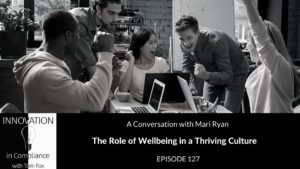
Mari Ryan is the CEO of Advancing Wellness and author of The Thriving Hive: How People-Centric Workplaces Ignite Engagement and Fuel Results. She joins Tom Fox on this week’s show to discuss the role of employee wellbeing in a thriving business culture.
Assessing Wellness
Many of the concepts and strategies concerning ethical values and corporate culture that Mari espouses, says Tom, are the same that a compliance officer would use. He asks Mari how her company helps clients assess their employees’ wellbeing. She describes her two-part process: the first part is the qualitative and quantitative assessment, and the second part is creating a strategic plan to operationalize a culture of wellbeing in the workplace.
Wellbeing Is Crucial to Business Success
“Wellbeing can serve as a foundational element to the culture of the workplace and to creating business success… You need to have engaged employees to create a sustainable business,” says Mari. Wellbeing is physical, emotional, and financial; it involves feeling connected to your purpose and to other people. Mari adds, “If I’m feeling more thriving in my wellbeing, then I am more likely to be engaged, to be productive, to be connected to the purpose of the organization and making contributions that are going to make for happy customers, happy colleagues and help everybody achieve their business goals.”
Employee Wellbeing Is An Indicator of Organizational Culture
Mari posits in her book that employee wellbeing is an indicator of an organization’s culture. She tells Tom that culture is the behaviors, norms, assumptions, and rituals within the organization. Purpose and values work together to form culture. If employees feel cared for and that their wellbeing is considered, the culture will be healthy.
Wellbeing During and Post COVID-19
Tom asks how Mari is counseling clients during the crisis. She responds that during a crisis we have to think about things from a different perspective. Stress is the major issue that everyone, no matter their circumstances, is dealing with during the pandemic. We will also have to deal with stress post COVID-19, she points out. She outlines the various types of support people will need after the pandemic.
Resources
Mari Ryan on LinkedIn
AdvWellness.com


